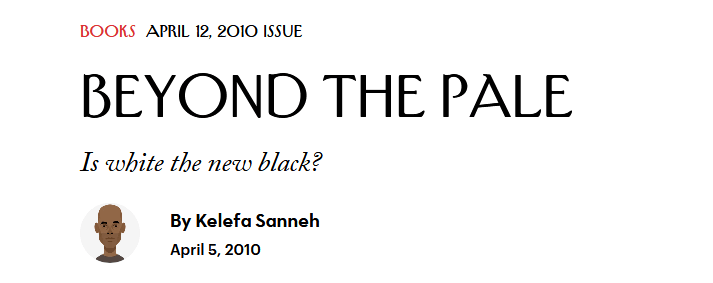


04/19/2010
"Is white the new black?"
So asks Kelefa Sanneh in the subtitle of "Beyond the Pale," his New Yorker review of several books on white America, wherein he concludes we may be witnessing "the slow birth of a people."
Sanneh is onto something. For after a year of battering as "un-American," "evil-doers" and racists, and praise from talk-show hosts and Sarah Palin as "the real Americans," Tea Party America seems to be taking on a new and separate identity.
Ethnonationalism — the recognition of an embryonic people that they are different from their neighbors, and the concomitant drive to live apart — is, as Arthur Schlesinger Jr. wrote 20 years ago, a more powerful force than any ideology, be it communism, fascism or democracy.

Ethnonationalism is the pre-eminent force of the age we have entered, the creator and destroyer of empires and nations. Even as Schlesinger was writing his "Disuniting of America: Reflections on a Multicultural Society" , Yugoslavia and the Soviet Union were disintegrating into 22 new nations, along the lines of ethnicity. In Dagestan, Ingushetia, Chechnya, Ossetia and Abkhazia, the process proceeds apace.
It has happened before — and here.
In the American colonies, the evil institution of slavery, followed by a century of segregation, created out of the children of captured Africans who had little in common other than color a new people, the African-Americans, who went out and voted 24-to-one for Barack Obama.
In 1754, the 13 colonies consisted of South Carolinians, New Yorkers, Pennsylvanians and Virginians, all loyal subjects of the king.
But after the contemptuous treatment of colonial soldiers in the French and Indian War, the Stamp Act, the Townshend duties, the Boston Massacre, the Tea Party, the Quartering Act and the Quebec Act, by 1775 a new people had been born: the Americans.
In 1770, New York colonists had erected a statue of George III in Bowling Green in grateful tribute for his repeal of the Townshend taxes. In July 1776, they pulled it down and melted it for lead bullets after Washington read his soldiers the Declaration of Independence portraying George III as another Ivan the Terrible.
"There is no such thing as a Palestinian people," said Golda Meir. When she said it, she may have been right. But as generations have grown up under the occupation and two intifadas and a Gaza War, the Palestinians are a people today.
Adversity and abuse increase the awareness of separate identity and accelerate the secession of peoples from each other.
Obama in the campaign of 2008 recognized that "out there" in Middle America existed another country, far from the one he grew up in, far from the privileged Ivy League community to which he belonged.
"You go into some of these small towns in Pennsylvania, and … the jobs have been gone now for 25 years. … So it’s not surprising then that they get bitter, they cling to guns or religion or antipathy to people who aren’t like them or anti-immigrant sentiment or anti-trade sentiment as a way to explain their frustrations."
Palin and Tea Partiers now repeat Obama’s disparaging line about their clinging to Bibles and guns — with defiant pride.
As others have done in our multicultural and multiethnic nation, this people is beginning to assert its identity, unapologetically.
Sioux gather at Little Bighorn to celebrate the massacre of Custer’s command. Hawaiian natives demand a new ethnically based government — and receive Obama’s blessing. Hispanics march under Mexican flags in Los Angeles to demand citizenship for illegal aliens.
Now Southerners are proudly commemorating ancestors who fought and fell in the Lost Cause and demanding recognition of Confederate History Month. And state governors are acceding.
In 2004, when Howard Dean reached out to "guys with Confederate flags in their pickup trucks," Shelby Steele wrote that this was "absolutely verboten. Racial identity is simply forbidden to whites in America" because of their history and white guilt.
This, Sanneh suggests, is changing. The imputation of racism to Tea Partiers has not intimidated or cowed them.
When Obama named Sonia Sotomayor to the Supreme Court, there was no hesitation in blistering her for showing contempt for the rights of Frank Ricci and the white firefighters of New Haven, cheated of the promotions they had won in competitive exams.
When black Harvard professor Henry Louis Gates was arrested by Cambridge cop James Crowley, most Americans, despite Obama and media suggestions of racial profiling, sided with Crowley.
Why are the Tea Partiers not intimidated the way Republicans often are? Why is the charge of racism not working?
First, they do not feel the guilt of country-club Republicans.
Second, they know it to be untrue. While Tea Partiers are anti-Obama, they are also anti-Pelosi, anti-Martha Coakley and anti-Charlie Crist. The coming conflict is not so much racial as it is cultural, political and tribal.
Black America seems united. White America is the house divided, for it is in the womb of white America that this new people is gestating and fighting to be born.
COPYRIGHT CREATORS SYNDICATE, INC.
Patrick J. Buchanan needs no introduction to VDARE.com readers; his book State of Emergency: The Third World Invasion and Conquest of America, can be ordered from Amazon.com. His latest book
is Churchill, Hitler, and "The Unnecessary War": How Britain Lost Its Empire and the West Lost the World, reviewed here by Paul Craig Roberts.